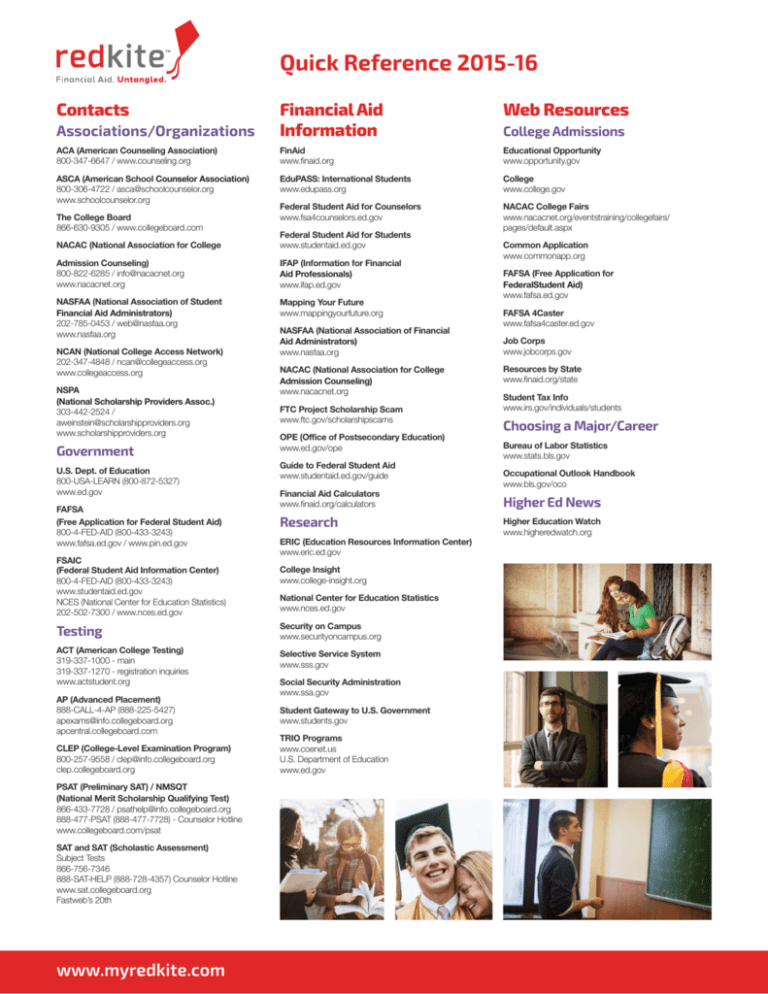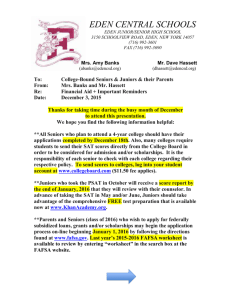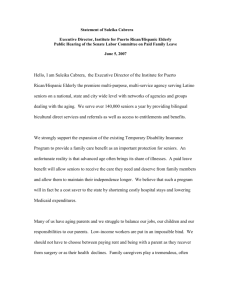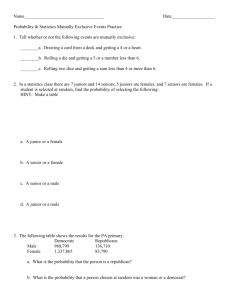Calendar - Red Kite
advertisement

Quick Reference 2015-16 Contacts Web Resources Associations/Organizations Financial Aid Information ACA (American Counseling Association) 800-347-6647 / www.counseling.org FinAid www.finaid.org Educational Opportunity www.opportunity.gov ASCA (American School Counselor Association) 800-306-4722 / asca@schoolcounselor.org www.schoolcounselor.org EduPASS: International Students www.edupass.org College www.college.gov Federal Student Aid for Counselors www.fsa4counselors.ed.gov NACAC College Fairs www.nacacnet.org/eventstraining/collegefairs/ pages/default.aspx The College Board 866-630-9305 / www.collegeboard.com NACAC (National Association for College Federal Student Aid for Students www.studentaid.ed.gov Admission Counseling) 800-822-6285 / info@nacacnet.org www.nacacnet.org IFAP (Information for Financial Aid Professionals) www.ifap.ed.gov NASFAA (National Association of Student Financial Aid Administrators) 202-785-0453 / web@nasfaa.org www.nasfaa.org Mapping Your Future www.mappingyourfuture.org NCAN (National College Access Network) 202-347-4848 / ncan@collegeaccess.org www.collegeaccess.org NSPA (National Scholarship Providers Assoc.) 303-442-2524 / aweinstein@scholarshipproviders.org www.scholarshipproviders.org Government U.S. Dept. of Education 800-USA-LEARN (800-872-5327) www.ed.gov FAFSA (Free Application for Federal Student Aid) 800-4-FED-AID (800-433-3243) www.fafsa.ed.gov / www.pin.ed.gov FSAIC (Federal Student Aid Information Center) 800-4-FED-AID (800-433-3243) www.studentaid.ed.gov NCES (National Center for Education Statistics) 202-502-7300 / www.nces.ed.gov NASFAA (National Association of Financial Aid Administrators) www.nasfaa.org NACAC (National Association for College Admission Counseling) www.nacacnet.org FTC Project Scholarship Scam www.ftc.gov/scholarshipscams OPE (Office of Postsecondary Education) www.ed.gov/ope Guide to Federal Student Aid www.studentaid.ed.gov/guide Financial Aid Calculators www.finaid.org/calculators Research ERIC (Education Resources Information Center) www.eric.ed.gov College Insight www.college-insight.org National Center for Education Statistics www.nces.ed.gov Testing Security on Campus www.securityoncampus.org ACT (American College Testing) 319-337-1000 - main 319-337-1270 - registration inquiries www.actstudent.org Selective Service System www.sss.gov AP (Advanced Placement) 888-CALL-4-AP (888-225-5427) apexams@info.collegeboard.org apcentral.collegeboard.com CLEP (College-Level Examination Program) 800-257-9558 / clep@info.collegeboard.org clep.collegeboard.org PSAT (Preliminary SAT) / NMSQT (National Merit Scholarship Qualifying Test) 866-433-7728 / psathelp@info.collegeboard.org 888-477-PSAT (888-477-7728) - Counselor Hotline www.collegeboard.com/psat SAT and SAT (Scholastic Assessment) Subject Tests 866-756-7346 888-SAT-HELP (888-728-4357) Counselor Hotline www.sat.collegeboard.org Fastweb’s 20th www.myredkite.com Social Security Administration www.ssa.gov Student Gateway to U.S. Government www.students.gov TRIO Programs www.coenet.us U.S. Department of Education www.ed.gov College Admissions Common Application www.commonapp.org FAFSA (Free Application for FederalStudent Aid) www.fafsa.ed.gov FAFSA 4Caster www.fafsa4caster.ed.gov Job Corps www.jobcorps.gov Resources by State www.finaid.org/state Student Tax Info www.irs.gov/individuals/students Choosing a Major/Career Bureau of Labor Statistics www.stats.bls.gov Occupational Outlook Handbook www.bls.gov/oco Higher Ed News Higher Education Watch www.higheredwatch.org Quick Reference 2015-16 College Readiness: Calendar for Counselors and Students August •• Put together a calendar of upcoming local college fairs. •• Encourage seniors to begin planning college visits. •• Hold college essay writing workshops. September •• Remind sophmores to register for the PSAT. Help them find tutors and practice tests. •• Meet with juniors about schools that interest them. •• Continue to meet with seniors regarding their college applications. •• Encourage seniors to begin asking for recommendation letters. •• Help seniors determine if they need to retake standardized tests. October •• Juniors should take the ACTE SAT. •• Continue to meet with juniors about schools and majors that interest them. •• Proofread college essays and personal statements for seniors. November •• Provide juniors with personality profile questionnaires to help them learn about their preferences. •• Seniors should take or retake the SAT, if necessary. •• Seniors should submit preliminary high school transcripts to schools they are considering. •• Help seniors search and apply for private scholarship funds. December •• Meet with juniors about their PSAT scores. Help them find study groups, tutors and other resources to improve their scores. •• Remind seniors to begin collecting the documents they’ll need to complete the FAFSA. January •• Juniors should begin finding scholarships and applying. •• Juniors taking the ACT need to register and study. •• Encourage seniors to complete and submit the FAFSA as soon as possible after January 1. February •• February is Financial Aid Awareness Month. •• Juniors should register and prepare for the SAT and any other standardized or entrance exams required by the school of interest. •• Help juniors narrow down their schools of interest. •• Help seniors continue to research and apply to scholarships. •• High school transcripts should be sent to the colleges seniors are considering. •• Seniors should have all applications submitted, as March is the typical deadline for many schools for the following fall semester. March •• Encourage juniors to look for summer opportunities such as volunteer work or a part-time job. •• Encourage seniors to stay focused on their studies and keep their grades up. •• Seniors should notify financial aid offices regarding any private scholarships they’ve won. www.myredkite.com April •• Juniors should complete the ACT exam. •• Help seniors compare financial aid packages and determine if they are sufficient for the student to attend the school of their choice, or if they will need to apply for additional financial aid such as education loans from private lenders. May •• Meet with juniors to help them determine the best classes to take in their senior year. •• Assist juniors with finding opportunities to earn college credit. •• Seniors should make their final decision on the school they want to attend in the fall and make their enrollment/housing deposit. •• Encourage seniors to take any Advance Placement exams that your college may offer. •• Help seniors ensure sure any college credits they have earned transfer to their selected school. Planning Ahead: A Calendar for High School Seniors Hopefully, you have done many of the items from the junior year calendar. If you have not, it is okay – you still have plenty of time. Your senior year will simply be a little busier than you may have intended. The following calendar is a suggested guideline; be sure and get actual dates and times from your high school counselors. August •• Make a folder for each of the colleges that interest you and fill them with print pieces, financial aid information, and application requirements and deadlines. •• Choose when you would like to visit each school that interests you •• Start drafting your personal statement or essay for each college. September •• Continue searching and applying for private scholarship funds. •• Fill out any additional financial aid forms such as the CSS Profile Form that your college requires. December •• Check with the colleges to which you’ve applied to determine your status of your application. •• Begin collecting the documents you will need in January to apply for the FAFSA. January •• Complete and submit the FAFSA as soon as possible after January 1. Contact 1-800-4-FED-AID if you have questions. February •• February is Financial Aid Awareness Month so look for any additional information regarding financial aid. •• Make sure your high school sends your mid-term transcript to the colleges you are still considering. •• Make sure all your applications are submitted. March is the typical deadline for many schools for the following fall semester. March •• Expect to receive the Student Aid Report (SAR) 4-6 weeks after submitting the FAFSA and review the SAR for accuracy. •• Keep focused on your studies and keep your grades up. If you fall below a college’s standards you can lose your acceptance and any scholarships you have been awarded. •• Notify your financial aid offices regarding any private scholarships you have won. April •• Compare financial aid packages and determine if they are sufficient for you to attend the school of your choice or if you need to apply for additional financial aid such as education loans from private lenders. •• Log into the college portal and accept your financial aid award letter to the schools you are still considering. May •• Decide to whom you wish to send letters of recommendations. These may be from your favorite teachers, coaches, local representatives, employers and any alumni from the particular schools that interest you. •• Remain in contact with the admissions representatives from the colleges that interest you. •• Continue to meet with your guidance counselor regarding college applications and to determine if you need to take or retake any standardized tests. •• Complete the admission forms for each of your college of interest. •• Make your final decision on the school you want to attend in the fall and make your enrollment/housing deposit. Remember, if you end up not liking your chosen school, you can always transfer. •• Send thank you notes to teachers, guidance counselors and anyone who sent a letter of recommendation through this process. •• If you qualify, take any Advance Placement exams that your college may offer. •• Make sure any college credits you have earned transfer to your selected school. October Summer Months before College •• If you have not decided on a school, continue attending College Nights or College Fairs at your school or your community to learn more about various schools. •• Finish your essays or personal statements and make sure you have a teacher proofread them. •• Finalize dates to visit and take tours of schools and campuses. •• Provide addressed, stamped envelopes to anyone who has agreed to write you a letter of recommendation. Be sure and tell them when the letters are due. •• Take or retake the ACT, if necessary. November •• Take or retake the SAT, if necessary •• Submit “preliminary high school transcripts” of your grades so far to schools you are considering. •• Have your high school send your final transcript to your selected college. •• Learn to: •• Do laundry. •• Use several different kinds of microwave ovens. •• Use a fire extinguisher. •• Do other life skills you and your parents feel you should have to live independently. •• Start working to save for college expenses. Then, enjoy the summer.




